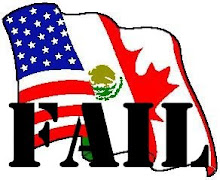The Winnipeg Free Press posted a story today about a Winnipeg' couple’s experience crossing into the US for a weekend trip of golfing and shopping. Unfortunately 54 year old Donald Miller’s name and birthdate was shared by someone who, when entered into the US CBP system, came back as “armed and dangerous”.
CBP officers surrounded the car and drew weapons on the couple, instructing them to get out of the car where they were handcuffed and brought into separate interrogation rooms where Mr. Miller was subjected to what the news story describes as an “embarrassingly intimate search”. He was not told why he was being detained although he asked, and had a gun pointed at him during the search and during an interrogation. Finally he was freed and was told it was mistaken identity.
I’m in agreement with Donald in that there was nothing wrong with how the CBP officers reacted. Just like I would expect for our Canadian guards, if the information given suggests someone in front of them could be armed and dangerous, they need to protect themselves and ensure any threat is vetted and identified.
But wasn’t the WHTI supposed to deal with this? Canadians are now crossing with either a government issued passport or enhanced identification card. Canada has spent millions implementing these programs to ensure our citizens meet the requirements of the US border.
Even more disturbing is the system CBP officers use is an FBI operated database. From the news story:
The National Crime Information Center is a computerized database operated by the Federal Bureau of Investigation.
The database contains information on criminal records, fugitives, missing persons and wanted persons. As well, stolen licence plates are on file, as well as stolen boats and guns.
The information comes from several areas including the FBI, federal, state, local and foreign criminal justice agencies.
The database is open only to federal, state, local law enforcement agencies and other related justice agencies.
So you run a name through an FBI operated database, a name pops up saying armed and dangerous, but…what…the FBI database has no picture of the suspect, no description, nothing that can be cross referenced against the passport photo or *gasp* even just LOOKING at the guy in the car? Instead, a name and birthday match are all that’s required to yank a guy from his car and put him through the ringer while they determine if he’s *the* guy.
Maybe before Canada sunk so much money into getting our people ready for the WHTI standards we should have issued demands on the Americans to get their information systems in order as well.
And I totally echo Don’s comment about nobody offering any apology, regardless of the officers just doing their job.
"Thing is, the Americans don't know how to say 'I'm sorry for the inconvenience.'"



